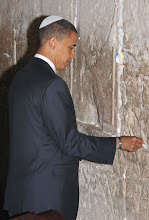 Myth: Saudi Arabia views the Arab Peace Initiative as a non-negotiable diktat or ultimatum to Israel. This, combined with their refusal to offer normalization gestures now, proves they're unwilling to make peace with Israel. Saudi prince Turki al-Faisal's recent New York Times op-ed confirms this.
Myth: Saudi Arabia views the Arab Peace Initiative as a non-negotiable diktat or ultimatum to Israel. This, combined with their refusal to offer normalization gestures now, proves they're unwilling to make peace with Israel. Saudi prince Turki al-Faisal's recent New York Times op-ed confirms this.The Facts: The Saudis strongly support Palestinian-Israeli and Arab-Israeli negotiations under President Obama. But just as Israel has certain sacrosanct demands on which it believes it cannot compromise, so too do the Saudis, the Syrians and the Palestinians. Israel holds that recognizing a Palestinian refugee “right to return” to former homes or villages in Israel is inconsistent with the principle of two states for two peoples – Israel as the state of the Jewish people, and Palestine as the state of the Palestinian people.
The Saudis, for their part, support peace and normal relations with Israel if it withdraws from all territories it occupied in 1967, but they recognize and accept that the Palestinians have agreed, first at the Camp David summit in 2000, to the principle of a land swap: Israel will be permitted to incorporate into its final borders Jewish neighborhoods in East Jerusalem and some settlements close to the Green Line in exchange for territory from within Israel that is equal in quantity and quality. Israel withdrew from 100% of the Sinai when it made peace with Egypt, and in negotiations conducted by Netanyahu during his first term Israel accepted that a peace treaty with Syria must be based on an agreement to demarcate the 1967 border between Syria and Israel.
Israel agreed to withdraw completely from Syrian territory in the Golan Heights: Ynet reports that “in the document passed on to President Clinton by Ron Lauder, who had served as Netanyahu's emissary to the Syrians” during his first term as prime minister, Israel committed “to withdraw completely from the Golan Heights…in return for Syria permitting an American-French early warning station on Mt. Hermon.” The Lauder document reads: “Israel will withdraw from the Syrian land taken in 1967, in accordance with Security Council Resolutions 242 and 338, which established the right of all states to secure and recognized borders in the 'land for peace' formula, to a commonly agreed border based on the line of June 4, 1967. The withdrawal will be effected in three stages and completed over a period of 18 months with the normalization implemented in the third stage and declaring an end to the state of war during the first phase of the withdrawal.” (Danny Yatom, who served as Mossad director at the time, is publishing the Lauder document in a new book.)
Israel’s acceptance of the need to withdraw from all of the territory occupied in 1967 in exchange for peace with both Egypt and Syria established a clear precedent. The Palestinians therefore believe that they too should receive no less than the equivalent of 100% of the territory in the West Bank and Gaza in exchange for peace and normalization with Israel. In their case, the demand has even greater justification given that they are agreeing to make peace with Israel in exchange for 22% of historic Palestine, with the other 78% comprising Israel - this despite the fact that the current Palestinian West Bank and Gaza population of 3.5 million is projected to virtually double within ten years to 6.6 million, according to the Rand Corporation, a leading think-tank. A peace treaty on this basis, which is acceptable to the Palestinians, will leave Israel with more than three times as much land as the Palestinian state, despite the fact that the Palestinian population will be almost equal in number to the Israeli population by 2020.
2. The facts about Saudi willingness to normalize relations with Israel: Prince Turki al-Faisal is the former director of Saudi intelligence and a former Saudi ambassador to the U.S. In his New York Times op-ed, (“Land First, Then Peace,” September 13, 2009) the prince rejects calls for Saudi King Abdullah to “do a Sadat” by traveling to Israel to extend his hand in peace until Israel offers what Israeli Foreign Minister Moshe Dayan promised to President Anwar Sadat’s envoy before Sadat’s historic visit to Jerusalem: a commitment to withdraw from all Egyptian territory occupied by Israel in 1967: “Absent a similar offer today from Israel to the leaders of Palestine, Lebanon and Syria,” he suggests, “there is no reason to look at 1977 as a model.”
Prince al-Faisal is right to cite the precedent of Dayan’s secret advance offer of full withdrawal from the Egyptian Sinai; late in life, Begin publicly confirmed it. The Saudi prince has thrown down the gauntlet: Israeli and American leaders should now pick it up. Netanyahu, like the leaders of Labor and Kadima, accepted the principle of full withdrawal with Syria in previous negotiations. Labor and Kadima leaders also accept this principle, subject to land swaps, for the West Bank and Gaza. If Netanyahu is serious about pursuing peace, he and Likud moderates should form a coalition government with Labor, Kadima and other parties willing to negotiate a comprehensive peace treaty with the Arab states on the basis of the 1967 borders.
The Saudi prince’s op-ed clearly suggests that in exchange for such a credible advance Israeli commitment of complete withdrawal for peace – in this case, reinforced by an American commitment from President Obama – mirroring Dayan’s offer to Sadat’s envoy, the Saudis may be prepared to take some significant early normalization steps with Israel, perhaps including a “Sadat”-like visit to Israel. To achieve this kind of revolutionary breakthrough, which would boost Israeli public support for moving forward with negotiations, Netanyahu must be prepared to establish his and his government’s credibility on the issue of territorial withdrawal, the main issue in Saudi, Syrian and Palestinian eyes.
Not only the Saudis, but many Israelis and Americans, have well-founded doubts about Netanyahu’s willingness to make the necessary territorial compromise in the West Bank, and to accept a viable territorially contiguous Palestinian state. For many years Netanyahu opposed the idea of a Palestinian state, and many in his Likud party continue to do so. It is therefore not unreasonable for the Saudis to be wary at this point of extending normalization gestures to Israel when it has reason to believe that Netanyahu does not intend to make credible offers on the extent of future Israeli territorial withdrawals in the West Bank, or on freezing Israeli construction in Palestinian neighborhoods in East Jerusalem – a step which Netanyahu has refused to take.
The facts about Saudi Arabia's willingness to make peace with Israel: In a response to a letter from the United States Congress to King Abdullah “urging the kingdom to make a dramatic gesture towards Israel as a confidence building measure to promote peace,” Saudi Ambassador to the United States Adel A. Al-Jubeir “reiterated Saudi Arabia's position that an incremental approach to peace, or one built on confidence-building measures, will not succeed. ‘It has not succeeded over the past three decades and, we believe, will not succeed today.’” (Published in the English-language newspaper Asharq Alawsat, “Peace Built on Confidence-Building Measures Will Not Succeed,” September 15, 2009)
The Saudi ambassador wrote that “The basis for ending the Arab-Israeli conflict is clear. It has been enshrined in numerous international resolutions, and highlighted in virtually every peace conference convened over the past three decades. Essentially, it centers on Israel ending its occupation of the territories taken in 1967, including Jerusalem, establishing an independent Palestinian state, and providing for a just settlement for Palestinian refugees. In exchange, Israel shall receive full recognition, a formal end to the conflict, peace, security and normal relations with all Arab countries.
“The Arab countries accepted this formula as a basis for a settlement when they unanimously adopted the Arab Peace Initiative at the Beirut Summit in 2002. This bold and historic initiative was also adopted by the Islamic countries at the Makkah Summit in December 2005, and reiterated by the Arab League at subsequent Arab Summits, including, most recently, at the 2009 Doha Summit. Israel has not. Nor has Israel accepted the principle that it must end its occupation of all Arab territories…Further, Israel continues to build settlements in defiance of international law and to strengthen its hold on the Palestinian Territories, when it should understand, as then-Crown Prince, now King, Abdullah bin Abdulaziz stated in his address to the Arab Summit in Beirut in 2002, that 'peace and the retention of occupied Arab territories are incompatible and impossible to reconcile or achieve.'
In the past, the Ambassador said, “a number of confidence-building measures were undertaken, but no peace was achieved. ” He affirmed that it is the Kingdom’s “firm view that resolution of this conflict does require outlining the final settlement at the outset, followed by prompt resumption of negotiations on all final status issues – borders, Jerusalem, water, security and refugees – with a deadline set for their early conclusion. The focus must be on the final settlement and on the final peace, not on an incremental process. This will make the final outcome clear to all parties, and thereby undermine the ability of extremists on both sides to delay or derail the movement to peace. It is also absolutely imperative for the United States to play an active and robust role in the negotiations, as history has shown.”
3. Finally, Israeli and American critics of the Saudi position have completely ignored a new and critically important Saudi concession on the refugees in the Saudi prince’s op-ed: “The Arab world, in the form of the Arab peace initiative that was endorsed by 22 countries in 2002, has offered Israel peace and normalization in return for Israeli withdrawal from all Arab territories including East Jerusalem — with the refugee issue to be solved later through mutual consent.” Critics have for years ignored the Arab Peace Initiative's compromise on the resolution of the refugee issue: Saudi and Arab willingness to accept a just and mutually agreed solution to the problem.
Now they are compounding their error by ignoring the Saudi offer to defer negotiations over the resolution of the refugee issue until after the establishment of a Palestinian state. This position shows a Saudi willingness to deal first with resolving the territorial aspects of the conflict, a refreshing and welcome pragmatism which improves the prospects for successful negotiations. What’s more, it suggests that the Saudis and other Arab countries may be willing to normalize relations with Israel once the territorial aspects of the conflict are resolved, even before negotiations on the refugee issue have been completed.





